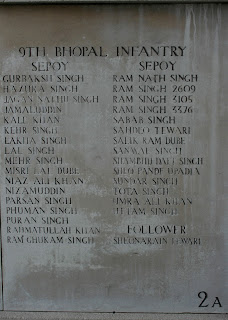Remembrance Day Portnahaven 2012
The War Memorial stands on a prominent hill overlooking both villages and the Atlantic. It is a perfect day. Bright with scattered cloud. A cool north-westerly is cold enough to notice but not enough to matter. In the south the coast of Northern Ireland is softly visible. To the west stands the lighthouse on the isle of Orsay. Breakers are softly crumping over Frenchman’s Rocks in the north-west. On the other side of the village a dog barks at the seals in the bay. Seagulls wheel overhead mainly silent, a sparrow chirrups nearby followed by the alarm chatter of a pipit. A skein of geese honk their way across the sky.
On the other side of the village subcontractors continue buzzing and humming as they renew water pipes. No two-minute silence for them. Even on a Sunday - and particularly this Sunday - mammon must thrive.
At the foot of the memorial lie two wreaths already in place. One from the council and one from the WI. A shortage of vicars on the island has meant the ceremony began and ended well before 11-00 a.m. This enabled the vicar to get to another ceremony in a neighbouring village.
On one side of the memorial are a list of 13 names from the First World War and on the other side are an additional 11 names from the Second. These are relatively high numbers from an outlying rural area. Several met their deaths at sea as sailors in the Merchant Navy or Royal Navy. They lie in the depths of the Atlantic. The same ocean that today looks so benign.
 Meanwhile down in Whitehall the ‘official’ ceremony takes place. In an article in today’s Telegraph, Baroness Warsi made the not unreasonable plea for the memory of many colonial troops who died in strange lands for causes a long way from their own not to be forgotten. To cite one example, "from the 3 to 23 November 1914, the two division India Corps suffered an average loss of 90 men per day. In the space of a ten-minute bombardment on 7 November, 9th Bhopals sustained 55 casualties with another 15 men hit a little later." Gordon Corrigan 'Sepoys in the Trenches' as quoted in 'Forgotten Victory' by Gary Sheffield. The photo is from the Menin Gate in Ypres which commemorates over 50,000 soldiers who were killed in the area and who have no known grave.
Meanwhile down in Whitehall the ‘official’ ceremony takes place. In an article in today’s Telegraph, Baroness Warsi made the not unreasonable plea for the memory of many colonial troops who died in strange lands for causes a long way from their own not to be forgotten. To cite one example, "from the 3 to 23 November 1914, the two division India Corps suffered an average loss of 90 men per day. In the space of a ten-minute bombardment on 7 November, 9th Bhopals sustained 55 casualties with another 15 men hit a little later." Gordon Corrigan 'Sepoys in the Trenches' as quoted in 'Forgotten Victory' by Gary Sheffield. The photo is from the Menin Gate in Ypres which commemorates over 50,000 soldiers who were killed in the area and who have no known grave.
Responses online were hostile. As usual with these sites there is a sour undercurrent of racism which is increasing and nasty but is particularly unpalatable on Remembrance Sunday. What did all these men and women die for? Another strand made more sense. Many pointed out the £12,000 in expenses that Warsi had somehow claimed wrongly thereby removed her of any right to comment. Some went further declaring that the presence of self-serving, venal politicians at the Whitehall ceremony was an insult to the dead.
They have a point. The days when the Cabinet was full of men, and some women, who had served in the Second World War are long gone. Prime Ministers Eden and MacMillan experienced at first hand the horrors of the First World War. Chancellor Dennis Healey won the Military Medal in combat at the D Day landings. When the Americans came calling for support for their Vietnam folly it was these and similar people who told them where to go.
How times have changed. The likes of Blair and Cameron can commit other people’s sons and daughters to danger and put them in harms way without having a clue what warfare is really like.
As Cameron placed his wreath was he thinking of the dead? Or was he thinking of the arms deal he had just concluded in the Middle-East?
No comments:
Post a Comment